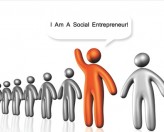
I have been giving a lot of thought these last months about the notion of social entrepreneur and its sustainability. There are a lot of confusion while using the word which is normal since it is a new concept but for me, there are really two different things, the business companies with a social angle and the real social entrepreneur looking to change the ecosystem in the (very) long run.
While googling for some definition, one can find:
-
“a person who establishes an enterprise with the aim of solving social problems or effecting social change” Dictionary
-
“ a leader or pragmatic visionary who: Achieves large scale, systemic and sustainable social change through a new invention, a different approach, a more rigorous application of known technologies or strategies, or a combination of these” Schwab foundation
So what about an NGO developing a new project? It does aim at solving social problem but does it really have a vision to create sustainable social changes? Changing the way things are? Not often…
What about an entrepreneur developing a new service and who is employing disadvantaged population or returning part of the profit to some social causes...I am also not sure, this is is all great but it does not really challenge the status quo
Don’t get me wrong, this is super important and we need more and more companies or businessmen to act like Bill Gates or Mark Zuckerberg and return part of their profit for NGOs.
What I am struggling with is the definition of social entrepreneurship? Why is important? Maybe because then I do understand better why it is so difficult to reach sustainability.
For the last 3 years, I have been attending the award ceremony of the Turkish Ashoka fellows and the speech of some of them really made me think...social entrepreneur are crazy people pursuing an impossible dream, someone that goes against everything (no money, crazy working time) because they do believe in what they are doing and that it is more important than everything...and then, the biggest achievement is that once the dream comes true, the government is taking it over and spreading the concept through the country..by itself...so what did the entrepreneur won? Satisfaction of having achieved his/her dream but certainly a “nice financial exit”.
So let’s go a step back, for me a social entrepreneur is someone having an innovative solution for an issue and that solution requires a total change of mentality, it can give the right to vote to women, change the habit of consumers towards more green products...think about it..how long did it take before it really happened? 20 years? 30 years? Could a green farmer really survived 30 years ago when we started speaking about green agriculture? I don’t think so..in 2017? It could be..
I also liked the examples of all these new teaching systems which went against 500 years of teaching methodology to experiment new ways of learnings. OK I am not comparing me to these revolutions but still, in Turkey, there is really very limited knowledge and support from corporate world to NGOs. We cannot change that in 1 year or in 3 years..it is really going to take long..little by little inspiring more professionals.
So how do you finance that? Could we really have a sustainable model? No, because it is so new and so different that everything else, no one is yet ready to really pay for a service. Some are (and thank you to our corporate members, Groupama, Engie, Ontex, Belarto and Ginini) like some people decided from the beginning to pay extra money for green products but this is not enough to call it a sustainable model, it is not enough for the farmer to live only from that..then we need patience and we need funds and grants from foundations (thank you to the BMW Foundation!).
Now, after 10-20 years, once for example some government started to see the benefits of these new school systems, they can just apply it everywhere, the dream of the entrepreneur is fulfilled but what will he/she do next? I am still struggling with that.
So in conclusion, I think I came to peace about the difficulty of having a sustainable business model while trying to change the way people are thinking and acting...we will then keep raising funds through support from corporate and institutional partners which believe that this change is needed and understand our role in that ecosystem and maybe one day we will come to a more revenue based approach!
What do you think?














